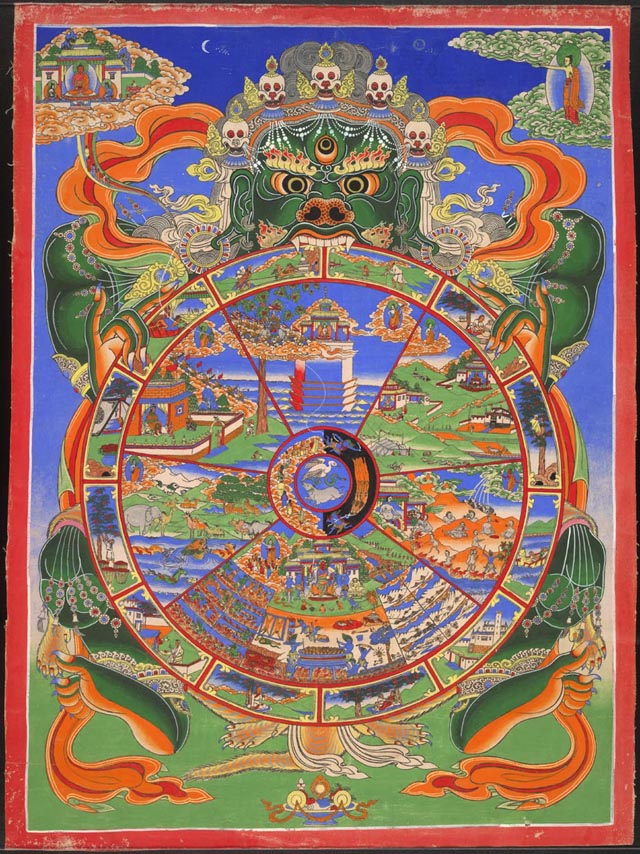|
Anatta
(no-self) Anicca applies to the self as well as everything else in Samsara. Buddhism teaches that the self is impermanent. There is no eternal, unchanging soul, no atman (an[no]-atta[atman]). This is where Buddhism differs from both Hinduism and Jainism If there no eternal soul, no atman, then what are we? What is this so-called "self"? Buddhism teaches that we are a collection of parts called Skandhas:
We each are who we are (our "self") as an aggregate of our parts, the sum total of our parts, no more, no less. The "self" is only the observing subject, not an object that can be observed. In essence we are the sum total of our experiences. There is experience but no one who is having the experience, no passive receiver of experience which could be called the "soul". The notion of being a self is an extrapolation from experience with no reality in and of itself. "Self" is little more than a mental/intellectual construct. In Buddhism "Self-realization" would be the realization that there is no self to be realized, only a "self" which can realize - the subject is its own object and "exists" only so long as it continues to experience itself or anything (like looking in a mirror - when you stop looking, walk away from the mirror, your mirror image disappears). We are more like an onion (without a core) than like a peach (pit as the essence) When this life ends those parts (the Skandhas) continue to exist but are no longer joined to each other. Thus there is no single, most elemental aspect of us which can be pointed to as our "true self" (i.e., "soul") and when we die, who we are in this life ceases to exist. If you tore a tree to pieces you’d still have limbs, leaves, a trunk, roots, etc. but you would no longer have a "tree". In essence the concept of "self", like "tree", is no more than that - a mental concept, not an actual independently real thing (object) ("Consciousness Only" school). Or, like a team in which members change over the years until it is entirely different but we still call it by the same name ("Redskins"). Only by disbanding the members of the team does the team "die" although the members continue to exist as individuals (members = skandhas). Indeed, even from year to year, day to day, moment to moment who we are in the moment, the "here and now", ceases to be as "we" become something different. Physically, our cells are completely new after seven years. Emotionally and intellectually, our feelings and thoughts also change as we grow. Indeed, to be fully, in the present moment ("Mindfulness"), is one major aspect of Buddhist living because the present moment is possibly the only (or most) real moment. The soul is not an unchanging thing. In essence, we are reborn in every moment but what we become depends upon what we were in the previous moment (Buddhist Karma). One life influences the next without any single element (e.g., "soul") of the two lives being identical and unchanging. Existence of the "self" is actually a chain of cause and effect, a series of phenomena or experiences, a "mental continuum". Often compared to a flame which, having lit the next candle, is then extinguished. The new flame is not identical with the old one although it originated with the old one. Learn more about the teachings of Buddha, including the teaching of no-self There has been a suggestion that to translate "anatta" as "no-self" - implying that there is no soul - is a mistaken understanding of the concept. Rather, it is no more difficult a concept than the virtue of being selfless - not thinking of one's self serving needs, overcoming egocentrism. "How can there be rebirth (reincarnation) without a soul to be reincarnated?"
Dependent Origination is the Buddhist understanding of karma and the process of reincarnation: A cycle that can start anywhere:
Learn
more about "Dependent Arising" One can be reborn into any of six realms of existence, Depending on one's karma, good or bad:
|
| Created by Laura Ellen Shulman |
Last updated: May 04, 2013
|
